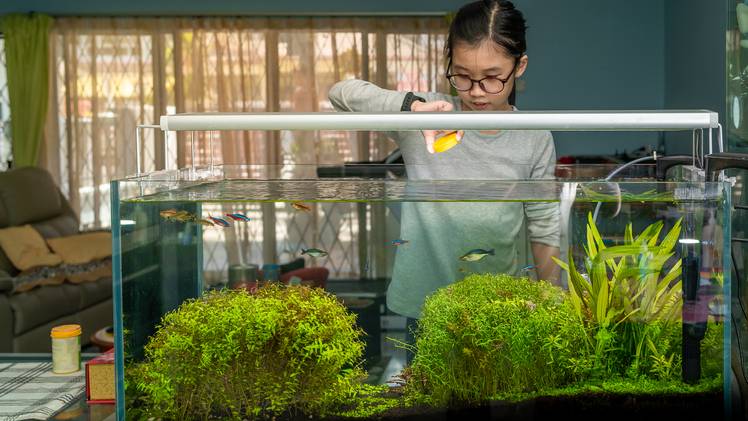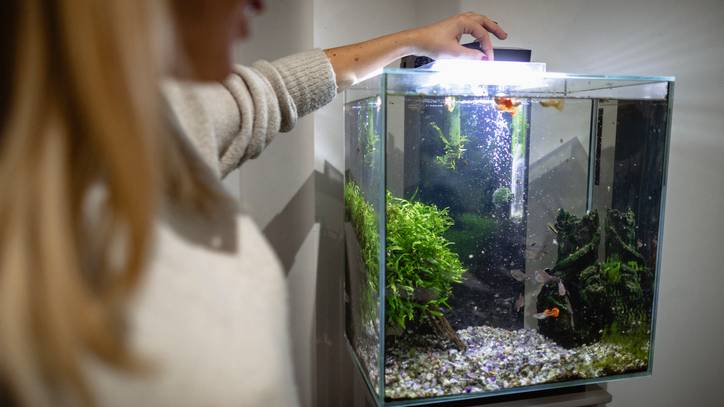How often should you feed fish?
Unsure about how often should you feed fish and when are the best mealtimes? Read on to find out

Get the best advice, tips and top tech for your beloved Pets
You are now subscribed
Your newsletter sign-up was successful
So you’ve splashed out on the best fish tank and your new pets are all settled in. But how often should you feed fish?
It’s important to get feeding right for fish to ensure that you don’t overfeed them, which can cause problems. The mantra of little and often usually works well with most fish, spreading out their meals (and even treats) across the course of a day.
According to the RSPCA, underfeeding is actually preferable to overfeeding, as poor quality water is generally a worse problem than not getting enough food.
You might be surprised to know that fish learn routines, just like you might expect from other types of pets, such as cats or dogs. If you consistently feed them at the same time every day, you might even find your fish waiting expectantly at the top of the tank.
Another thing that it’s important to remember is to feed your fish a well-balanced diet, and don’t just rely on commercially available fish flakes. Depending on the type of fish you have, you might find that they also enjoy typical human foods, such as vegetables, as well as other goodies such as shrimp.
Always check with your vet or fish provider to find out the perfect diet for your particular species – remembering that those who live in the best tropical fish tanks might have different needs compared to other types.
How long can fish go without being fed?
Unlike other more high-maintenance pets, leaving fish unattended is not a huge problem. Young fish should be regularly fed, but once they reach adulthood, if you need to go away for a couple of days or over a long weekend, you don’t need to be overly concerned.
Get the best advice, tips and top tech for your beloved Pets
In fact, if your fish is healthy you should find that a week or two without food won’t do any long-lasting damage. However, it’s always preferable to find another way to feed them if possible, such as asking a friend or neighbor to pop round, or investing in an automatic feeder.
You can also buy 'feeding blocks' that release food into the water. However, these can release too much food too quickly and contaminate the tank, so they aren’t highly recommended. Remember, overfeeding can be more of a problem for fish than underfeeding.
What times should I feed my fish?
There’s no specific time which you absolutely should feed your fish, but getting into a set routine is a good idea. It’s also generally a good idea to leave a gap between feedings, so mornings and evenings work well.
You’ll want to feed your fish little and often to make sure there’s no excess food contaminating the water, which is especially true if you’re using one of the best small fish tanks.
Generally, two or three feedings a day are adequate for most fish, so it might make sense to tie them in with your own meal times for ease of remembering. Something as simple as when you get up, or when you get home from work. Whatever you choose, consistency is key.

How do I know if I’m feeding my fish enough?
As we’ve said, underfeeding is less of a problem than overfeeding. However, you do need to make sure that your fish is getting enough food.
Fish don’t usually overeat, and will simply reject excess food if you’re giving them too much. It’s also true that many recommend purposefully underfeeding your fish on occasion to keep them in tip top condition.
Getting that balance right is crucial to keeping them happy and healthy by being well-fed, but without too much detritus in the tank or getting caught on the best fish tank accessories.
A simple way to test the amount you’re giving them is to see how much food the fish can eat in around a minute or two. If they aren't able to get through everything you give them, it usually means you’ve given them too much.
If after a further few minutes, there is still food untouched, you almost certainly have overfed them. Try reducing the amount next time until you hit the sweet spot of them being able to get through it all without having any leftovers.
If you’re concerned about your fish’s food intake – for example, if you’re worried that they are looking unwell – make sure to speak to your vet or breeder for further advice.
Can you overfeed fish?
Yes. Overfeeding fish is something that you should try to avoid. It’s best to figure out the right amount of food to feed them (see above) and try to stick to that as best you can.
Make sure others in your household aren’t also feeding your fish as well as you, and let them know the ideal schedule that you’ve decided upon. Treats for your fish are great but are best given in moderation and with adjustment to the amount of other food you’re giving them.
If you feed your fish too much, some common health problems include poor digestion, fatty liver, and fin rot. If you have several fish in the tank, this can not only be a problem for one particular fish but can also impact upon the rest of the aquarium.
With too much food, the water quality suffers and you might also create more extensive problems, such as clogged filters, which make cleaning and maintenance more difficult. Here are some tips on how to clean a fish tank.
Feeding your fish the correct amounts and caring for them well can lead to them having happy and healthy lives. Indeed, you’ll be surprised to learn how long goldfish live if kept well.
Amy Davies is a freelance writer and photographer with over 15 years experience. She has a degree in journalism from Cardiff University and has written about a huge variety of topics over the years. These days she mostly specialises in technology and pets, writing across a number of different titles including TechRadar, Stuff, Expert Reviews, T3, Digital Camera World, and of course PetsRadar. She lives in Cardiff with her dog, Lola, a rescue miniature dachshund.

